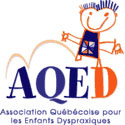Dyspraxia might just be the subtlest invisible physical handicap.
But what is dyspraxia?
Dyspraxia is a neurological impairment observed in approximately 6 % of children. It presents itself as a motor learning difficulty that can affect the planning and coordination of voluntary movements. It also translates into a difficultly in trying to think about and organize an action in your head and to make it more and more automatic until you do it without thinking about it.
Dyspraxia is not:
- An intellectual deficiency
- Cerebral palsy
- A behavioural disorder
- Laziness or a lack of interest
- Dysphasia or dyslexia
The cruelty of invisible handicaps
Children affected with dyspraxia generally look very normal and seem to function adequately but they are often unable to be entirely independent. Children with dyspraxia often have good speaking skills, some even talk a lot and have a rich vocabulary. Nevertheless, in most cases, these children have trouble expressing their thoughts and feelings. For that reason, the invisibility of this handicap is often the cause of misunderstandings.
In fact, these children constantly need to have a family to help integrate them into school and social life. Furthermore, parents often find it hard to show the difficulties since it cannot be seen at first glance.
Others may not easily perceive dyspraxia but parents definitively know that there is something not quite right with their little preschooler.

Recognizing the symptoms. My child...
- Is very clumsy. He drops or breaks everything he touches.
- Has trouble getting dressed, taking a shower or drying himself correctly.
- Has trouble eating properly and cutting food is a challenge.
- Forgets or looses personal effects.
- Dislikes games using strategies or puzzles.
- Has hard time writing and his drawings are weak and immature for his age (this problem remains permanent even if consistent effort is made).
- Cannot use scissors correctly.
- Is unable to remember or follow instructions and is generally poorly organised.
- Has difficulty throwing and catching a ball or riding a bike.
As the mother of a child suffering from dyspraxia, I first noticed that my child started talking very late and it seemed to be a challenge. The other symptoms listed above appeared around the age of 2 or 3 years old. Consequently, we decided to follow a program offered to help parents develop their child’s speaking abilities. It is called the Hanen program, often offered by a speech-language pathologist in local community centres or rehabilitation centres. My daughter also walked on all fours for a much longer period of time than what is seen in other children. I now know that these were some of the early motor signs of dyspraxia.

Remember, children who walk and talk later that others do not all have dyspraxia but keep in mind to listen to your maternal instincts! Do not hesitate to call a neuropediatrician rather than your family doctor if you are having serious doubts about dyspraxia. The earlier the diagnosis, the earlier your child will have access to rehabilitation methods. Ideally, the diagnosis should be made before starting school.
In concrete terms...
- Children with dyspraxia have an incredible memory, especially for things they learn with their heart or by heart! However, their memory is divided into different boxes that are not interconnected. In other words, the manner in which their knowledge is stored is completely disorganised.
- Children with dyspraxia tend to remember only the last thing they heard or recently discussed. These children will also integrate recent knowledge into their own personal life. For example, if your child reads a book on figure skating, he will probably answer that it is his favorite sport if you ask him the question.
- Children with dyspraxia cannot manage, organize or make coherent links with information they learn. For example, he may know a story by heart but he cannot tell the story in a logical sequence.
- He will get lost in his writing. The story is complete in his mind but he cannot put in into words on paper.
- You will need to be patient with a child suffering from dyspraxia. He will have a tendency to express ideas in a disorganized manner, meaning that you will have to put things in order yourself and ask questions if necessary.
- On a social or emotional level, these children are very fearful and easily destabilized by a new situation. He will have a low tolerance to frustration. He will have a tendency to lack verbal or physical censorship and might act inappropriately at times.
A doctor, most often a neuropediatrician, makes the diagnosis for dyspraxia. Furthermore, an evaluation with other occupational therapists and in neuropsychology can all be helpful in confirming the diagnosis and guiding the treatment plan and rehabilitation.
This article was written by Sylvie Breton, vice-president of the Quebec association for children with dyspraxia (Association québecoise pour les enfants dyspraxiques, AQED). Click here to read her blog. It contains many articles on dyspraxia (in French only).
 Association québécoise pour les enfants dyspraxiques (AQED)
Association québécoise pour les enfants dyspraxiques (AQED)
C.P 26024
Sherbrooke (Québec) J1G 4J9
Téléphone : 819-829-0594
Email :dyspraxieaqed@hotmail.com

